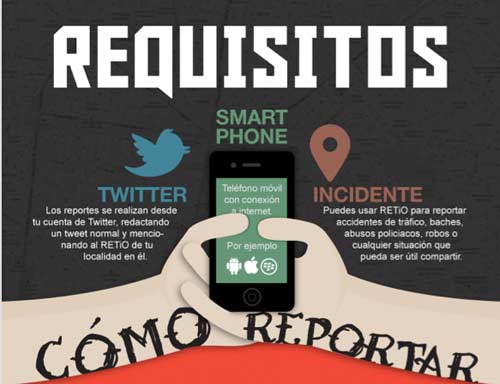
By Silvia Vinas, Global Voices
Diverse initiatives have arisen in Mexico that use citizen participation to report on the violence caused by drug trafficking, from the use of tags on Twitter to broadcast acts of violence that are censored by the media, to crowdsourcing initiatives like Hero Reports [es] used to geolocate reports of positive social behavior in the most violent cities in the country.
Retio is a free application that uses citizen reports to geolocate “information about shootings, murders and assaults, vandalism, blocked roads, police abuse and all kinds of corruption through Twitter.” Paula Gonzalo explains more about this application in an article from Periodismo Ciudadano [es] (Citizen Journalism).
What follows is the article [es] by Paula Gonzalo which is licensed under a NonCommercial Acknowledgement 3.0 Spain (CC BY-NC 3.0) Creative Commons license.
Technology has become a prominent tool in the effort to fight for the defense of human rights and freedom of expression. In this regard, there are numerous proposals for trying to deal with problems as serious as drug trafficking in Mexico. On PC [Periodismo Ciudadano] we have spoken of initiatives like El Blog del Narco [es], the wonderful work of Judith Torrea, with her blog Ciudad Juarez, in the shadow of drug trafficking [es], (a prize-winner selected by byReporters without Borders for her coverage on the War against Drug Trafficking) orWikinarco.com [es], who we also interviewed [es]. Now Mario Romero and Jose Antonio Bolio, two friends from Mérida, Yucatán, aged 29 and 24, are the creators of a free application called Retio [es] that tries to map the war against drug trafficking through the contribution of citizen reports.
The task is not easy but this application can be very useful for the citizens themselves considering that it allows the inclusion of information about shootings, murders and assaults, vandalism, blocked roads, police abuse and all kinds of corruption through Twitter. On their website [es] you can see how this mapping application works through Twitter. To send information you just need to include the Twitter address of the site followed by the city in which you find yourself, for example, @RetioDF [es], followed by the description of the problem to report.
An automatic system classifies the report according to the type of problem. Anyone with a Twitter account can contribute with information and access the site to find out about major incidents related to their city but, for the moment, only iPhone and iPad users can download the application. For instance they tell us [es] on their website:
The reports are sent via Twitter to the corresponding account for each city (example:@retioMID for Mérida). The system obtains the geographic information available in the report and classifies it for re-publication. Using a wiki system, web users can fill out the contents of the report, as well as map it if necessary.
In comments from the Texas Observer Romero, 29, points out:
“The original goal was to organize and optimize Twitter to avoid different problematic situations that people face every day in Mexican cities,” Romero says. “Users in different cities started using hashtags to inform themselves of these type of situations, but it wasn’t an ideal solution – our plan was to build a better tool to resolve this and we’ve been able to do that. But we’re still not done.”
Its two creators began to work on the project in January 2011 but it was not until July that it was launched in Mérida, and the launch was expanded to the City of Mexico, Monterrey and Guadalajara, the three largest cities in Mexico in August. In February 2012 the application was launched for the iPhone and the coverage was expanded to all states.
As pointed out by Priscila Mosqueda, it’s striking that while the Mexico DF Twitter account [es] exceeds 62,000 tweets with more than 6,000 followers, in Ciudad Juárez [es], only two tweets and 14 followers appear, although according to Romero this is normal at the beginning.
The application is not only interesting with regard to reports about problematic events but also with regard to combating police abuse [es]:
We also believe that it is important that the authorities know they are being monitored by citizens at all times and so behave accordingly. We are convinced that this will help inhibit extortion, arbitrary arrests, abuses of authority and acts of police brutality in the same way that transparency helps to inhibit corruption in other authorities.
In an interview with Periodismo Ciudadano [es] Judith Torrea spoke of Ciudad Juarez as “the most dangerous in the world since the beginning of the so-called war against drug trafficking”, perhaps that is why all efforts to actively involve its inhabitants in achieving a slightly safer life are welcome.
This post originally appeared on Global Voices.






